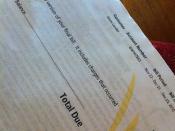Paul Taylor of the Financial Times in New York reports on the current lawsuit settlement between Vonage and Sprint, two major U.S. phone companies. In his article dated October 8, 2007 he describes that the reason for the ongoing lawsuit was patent infringement. Sprint Communications Company L.P. filed the lawsuit alleging that Vonage infringed six patents of SprintÃÂs when providing Voice over Internet Protocol (VoIP) telephony services and was seeking an appeal to overturn the jury verdict. Vonage, however, claimed that their technology was different from that of SprintÃÂs. The case resulted in a settlement to Sprint for $69.5 million in damages, five percent of VonageÃÂs revenues over the infringing period (Vonage, 2007).
When a company files for a patent, they file for a right to own that product or idea thus excluding anyone else from marketing it as his or her own or producing the same product. In other words, it gives the owner exclusive rights to the idea or product.
A patent is filed with the U.S. Patent and Trademark Office in Washington D.C. Patents are considered intellectual property rights and are protected by state and federal laws. If the patent is granted, it is usually granted for a period of time, making the product fair game after the period ends. The Federal Patent Statute of 1952, which was enacted by Congress, is ÃÂintended to provide an incentive for inventors to invent and make their inventions public and to protect patented inventions from infringementÃÂ (Cheeseman, 2004, p. 323). As with all cases, the loser can appeal the case. In the case of Vonage, if they were to appeal this case, they would do so through the U.S. Court of Appeals.
In the patent infringement case of Vonage versus Sprint, a jury trial was held in the Kansas City,


